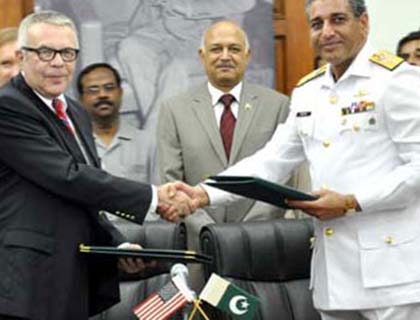Washington releases $1.18 bln under CSF; US to pay $250 customs tax on containers but no transit fee; Islamabad reserves right to refuse or reject shipments
RAWALPINDI - Pakistan and the United States on Tuesday signed into agreement a Memorandum of Understanding (MoU) on the reopening of NATO supply routes through the country, also allowing for the passage of weapons to the Afghan National Army (ANA) in landlocked Afghanistan.
The MoU was signed by US Charge D'Affaires Richard Hoagland and Additional Secretary of Defense Rear Admiral Farrokh Ahmad in Rawalpindi. The federal cabinet had earlier approved the draft of the MoU.
Under the deal, Pakistan will not levy any transit fee and the United States will pay a customs charge of $250 per container. Furthermore, cargoes will be allowed to transport food, medicines, and items of daily use to allied forces fighting in Afghanistan. While the deal specifies the routes to be taken and has a list running to several pages of lethal supplies that may not be transported through Pakistan, armored vehicles and Humvees have been permitted, provided weapons are not mounted on it.
The agreement replaces the existing arrangements for the passage of NATO supplies through the country into neighboring Afghanistan. According to the deal, Pakistan will allow the NATO convoys to travel into landlocked Afghanistan till the end of 2015. Islamabad agreed to reopen the NATO goods on July 3 after the routes' longest suspension in the 10-year war in Afghanistan in protest of botched US air raid that killed 24 Pakistani troops.
The agreement is part of an effort by the allies to patch up their fractious relationship, which plunged into a crisis last year over the US raid that killed Osama Bin Laden who was hiding in Pakistan. The signing comes a day before the head of Pakistani intelligence Lieutenant-General Zaheer ul-Islam begins a three-day visit to Washington for talks with the head of the CIA, which has been interpreted as another sign of gradual rapprochement.
Under the deal signed in Rawalpindi, the United States has also released $1.18 billion under the Coalition Support Fund to reimburse Pakistan for fighting militants within its borders. According to a statement issued by the Ministry of Defense, the MoU has been drafted in accordance with the UN Charter and in line with the parliamentary recommendations. A Central Coordination Authority has also been introduced to oversee the implementation of the pact. Furthermore, two routes are to be used for the passage of supplies: one from Port Qasim to Afghanistan via the southwestern Chaman border and the other from Port Qasim to Afghanistan via the northern Torkham Pass.
According to a US official, the deal will end at the end of 2015, well beyond the 2014 departure date for the bulk of NATO's 130,000 combat troops from Afghanistan, and can be renewed for one-year intervals beyond that.
Guidelines laid out by the Pakistani parliament earlier this year insisted that no weapons and ammunition could be transported through the country. A Pakistani official said the deal gave Islamabad the right to refuse or reject any shipment and that special radio chips would be fitted to the containers for monitoring purposes.
Richard Hoagland, who signed the agreement on behalf of Washington, hailed the MoU as a "demonstration of increased transparency and openness" between the two governments. Pakistan lifted its blockade on NATO supplies after US Secretary of State Hillary Clinton said sorry for the air raid deaths, but rows over security guarantees and compensation have delayed the resumption of normal traffic.
Officials closed the Torkham border crossing – the quickest route to Kabul from Karachi – to NATO traffic last Thursday over security fears. The Pakistani Taliban have vowed to attack the NATO supplies and last week a truck driver was shot dead in the northwestern town of Jamrud.
Speaking on the occasion, Secretary Defense (retd) Lieutenant General Asif Yasin Malik said the signing of the MoU would contribute to the stability of the region, and hailed the development as a "landmark event." (Agencies)

